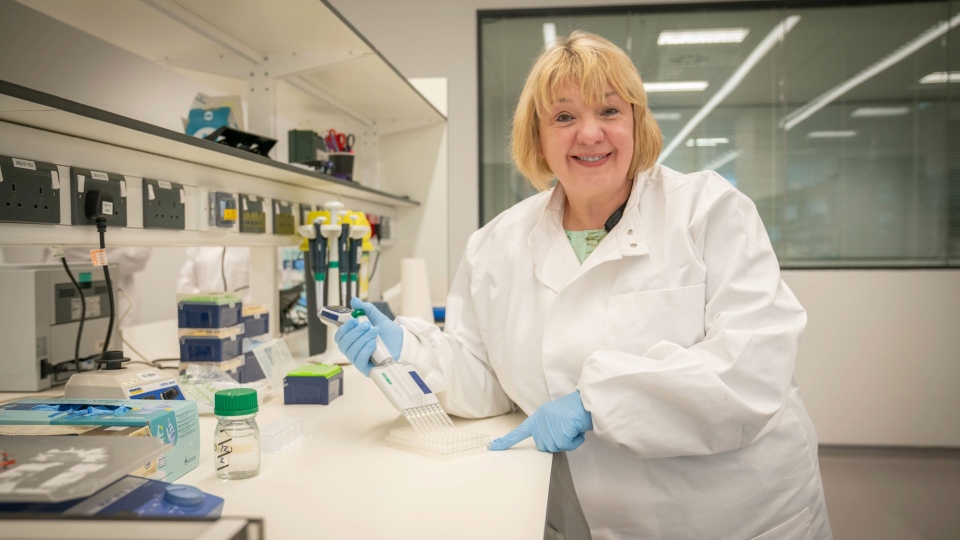Chadderton mum Sharon gets a sneak preview of the Cancer Research UK national biomarker centre
Date published: 12 June 2024

Sharon Quennell pictured at the Cancer Research UK National Biomarker Centre
An Oldham mum had a sneak preview of pioneering work at the Cancer Research UK National Biomarker Centre ahead of its official opening.
The state-of-the-art facility will help experts detect cancer at an earlier stage – when there’s more chance of a cure, anticipate how aggressive a patient’s tumour is, predict which treatments are likely to work best, and monitor responses to personalised treatment.
Biomarkers encompass a plethora of different tests that enable clinicians to manage a patient’s individual cancer in the best way possible.
Cancer Research UK will invest £2.5m into the National Biomarker Centre each year as part of an annual £26m investment in Manchester – putting the city at the heart of its mission to beat cancer.
Every year around 44,700 people are diagnosed with cancer in the North West.
Sharon Quennell, from Chadderton, was diagnosed with breast cancer in 2000 at the age of 36 after noticing a lump on her left breast.
She underwent surgery followed by 12 weeks of chemotherapy treatment.
Now 60, she will celebrate a quarter of a century free of cancer next year.
Sharon works at North Manchester General Hospital and is a single mum to Ryan, aged 29, who has autism and learning disabilities.
She has previously visited the laboratories in the Paterson Building and said: “I am always humbled to hear about the amazing research work happening in Manchester.
"Having a look at the National Biomarker Centre before the official opening is so exciting.”
The Paterson Building is also home to the Cancer Research UK Manchester Institute, part of The University of Manchester.
Professor Caroline Dive is Director of the National Biomarker Centre and Interim Director of the Cancer Research UK Manchester Institute.
She knows only too well the impact of cancer.
Her grandfather died from brain cancer before she was born. Her mother has undergone surgery on an endometrial tumour, and her father was treated for colon cancer. He passed away aged 95 years-old, following a further diagnosis of cancer.
Professor Dive said: “The impact biomarkers will have on patients' care can't be underestimated.
"Doctors will be able to get more information, faster, to determine the best treatment plan for each individual.
"And it will stop some patients from undergoing unnecessary interventions or treatments that could cause pain or discomfort without providing benefit.
"We are learning how to manage cancer. And that will mean we can give patients longer with their loved ones and a good quality of life."
Cancer Research UK’s chief executive, Michelle Mitchell, who will attend the official opening on Friday (June 14), said: “As the world’s largest charitable funder of cancer research, Cancer Research UK is at the forefront of the global fight against the disease, bringing together millions of people who share our determination to beat it.
“As a former student of The University of Manchester, I’m delighted that such an exciting and revolutionary facility will be housed in the city.
"Research at the Cancer Research UK National Biomarker Centre will help to transform cancer treatment in the future.”
Professor Graham Lord, Vice-President and Dean of the Faculty of Biology, Medicine and Health at The University of Manchester, said: “The Cancer Research UK National Biomarker Centre is a significant milestone in our mission to develop earlier and highly personalised treatments for cancer.
"It is fitting that this revolutionary approach will be based in Manchester, one of the world’s leading cities for cancer research.”
Do you have a story for us? Want to tell us about something going on in and around Oldham? Let us know by emailing news@oldham-chronicle.co.uk , calling our Oldham-based newsroom on 0161 633 2121 , tweeting us @oldhamchronicle or messaging us through our Facebook page. All contact will be treated in confidence.




